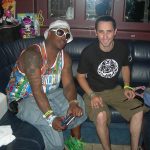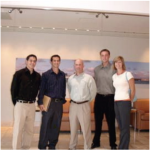When Andrew Hasbun decided to try to make it big in the world of television news, he left Los Angeles and moved to Medford, Oregon. Although this seems counter-intuitive, it is in fact the route followed by nearly all who commit their lives to the news.
 After Medford, Andrew found himself in Jackson, Mississippi, and was there as a reporter during hurricane Katrina. If ever he saw reporting the news as his passion, this was the time. The night before the worst of the storm, as everyone was evacuating, Andrew was reporting from one of the many Red Cross relief centers with 15,000 of the poorest Katrina evacuees. The concrete floor had no cots, blankets or pillows. An impassioned plea by the county sheriff, broadcast live during Andrew’s report, yielded thousands upon thousands of immediate donations and volunteers.
After Medford, Andrew found himself in Jackson, Mississippi, and was there as a reporter during hurricane Katrina. If ever he saw reporting the news as his passion, this was the time. The night before the worst of the storm, as everyone was evacuating, Andrew was reporting from one of the many Red Cross relief centers with 15,000 of the poorest Katrina evacuees. The concrete floor had no cots, blankets or pillows. An impassioned plea by the county sheriff, broadcast live during Andrew’s report, yielded thousands upon thousands of immediate donations and volunteers.
Andrew sees passion as a fundamental part of being a reporter, for Phoenix Fox 10 news, because of the sheer volume of sacrifice required to excel in the world of media. Humility is another essential element that allows a reporter to listen and learn from more experienced colleagues. Although the viewing public sees a meticulously refined broadcast, the process leading to that refinement is gritty and overwhelming. Andrew stresses the importance of teamwork in the newsroom. Even though anchors and reporters are physically communicating the news, they are only able to do so when relying on the tireless work of countless others.
Interview
We are in what appears to be the lounge/make-up room of FOX 10 News in Phoenix.
Andrew Hasbun
My first job was in Medford, Oregon. Small town. I was right out of college. I graduated, and I’m actually not that much older than you guys. I graduated in 2003. I lived in Medford, Oregon for almost two years. It was like blue video, on the air. Worst editing you’ve ever seen. I don’t know if you’re familiar with three quarter inch tape? It’s like the worst quality. It’s from 1970. It was a disaster.
You learn the hard way how to put it together. It’s just the way it works.
I have no idea what led me into news. To be honest. It’s just something I just like. People will tell you whether they’re doing print journalism or broadcast or whatever that they’ve wanted to do it since they were a kid. That’s how it was.
I would watch CNN when I was in 7th grade when everyone else was watching some other junk. I was more fascinated not necessarily with what the anchors were saying, but how it was done. And how it was all put together. And how they did it. And how they got what they got. How they did the live thing with somebody in Rome and the other person in Atlanta. I was fascinated with all that stuff.
I just stuck with it. I went to school for it. Moved away. It’s a huge commitment. Most people watch the news and they think that, ‘Oh wow. Those people just sort of got the job.’ That’s not the case. Every single person that you see here lived and worked in a small, miserable, stinking city for years before they got to a place like Phoenix, where they’ve been here for a decade. You have to give up a lot. It’s not just a walk in and work my way up to be the morning anchor type of thing. It doesn’t happen that way.
For example, Alexis, one of our anchors. ‘Alexis, how long did you live in Yuma?’
Alexis: ‘I lived there for two years.’
Andrew: ‘Two wonderful years?’
Alexis: ‘Oh my God. It was the most miserable thing ever.’
Andrew: See! And I was in Medford, Oregon for two years and it was probably the worst two years of my life. But you know what? You learn a ton. I left Los Angeles to move to Medford, Oregon. People thought I was nuts.
Alexis: ‘I left L.A. Manhattan Beach.’
Andrew: Wow! So see! She moved to Yuma, Arizona, which is even more nuts. At least the weather is nice in Oregon (laughs).
Alexis: ‘Nothing is nice about Yuma.’
I mean it’s rough. We left our families behind. We left our friends and whoever else we had and moved to the middle of nowhere to do this. So you really have to like it a lot. I know people who have moved away and then moved back home in three months because they’re like, ‘What am I doing? It’s just crazy.’ But, you have to really love what you do to do it.
That’s why you’ll find people in here who are very passionate, especially at this level. Because you have to be to move to Medford, Oregon to Jackson, Mississippi and spend those years out in the middle of nowhere without your family and without your friends. It’s rough. But it’s fun.
It’s a huge change. But that’s part of what makes the people who work in a market like this very well rounded. Because you’ve gone to Medford, Oregon. You’ve seen all that and what goes on there. It’s a totally different lifestyle. And then Mississippi, where it’s a completely different lifestyle than Medford or Los Angeles.
You have that grounding. You can talk about things that most people have never even seen or experienced. Which is great. That’s why you can either look at the experience and say, ‘God I moved to these miserable places and it was so horrible.’ Or you can say that it really made you better. Because it does. Those experiences did make me better.
In Medford I was responsible for my own photography. I was the camera man, I was the writer, I was the editor and the producer. I did everything. Crawling through the snow. It was a disaster. And it wasn’t good. To be honest with you man, it was some crap stories. But by the time I left, I had an appreciation for every job in the building. I was ready to leave, as anyone will tell you from their small market experience, they’re ready to leave. But they’re glad they went through it because it trained them very, very well.
I would say that you learn how to respect what other people do. Like I said before, putting a newscast on the air, one person can’t do it. There’s a huge team. You have to respect what everyone does. Because the minute you don’t respect what the other person does, and they might not make as much money as you. They might make substantially more money than you. They might tell you what to do. You might have to tell someone else what to do. It’s just this crazy web of people. You have to respect what the other person does to get along. That’s one of the things I learned in the small market. If I’m the one sitting there clacking away at the editing deck, you have to respect what they do. Because I know what they go through. I know how hard it is when the machines break and when you have to get stuff done at 5 o’clock and it’s 4:58 and it’s not done. You pull your hair out.
So you got to give them respect and you got to appreciate what they do. That’s what I’ve taken to Phoenix.
I had that sense of wanting everything now when I graduated. But it went away fast when I started carrying a forty pound tripod through the snow. You sort of ask, ‘What am I doing here?’ But for young people going into the world, everyone, I don’t know, you sort of have to be quiet. And observe. And watch what other people do. That’s my advice. Worst thing any grad can do is to go in thinking that they’ve learned everything they need to know about their career in college. Because you have a business degree does not mean you’re a CEO. Or just because you graduated with a degree in journalism does not mean you’re going to be an anchor right away. Or that you know more than the anchor that’s there. No. You have to be a little humble. That’s my advice to grads. So grads, be humble.
I learned that the hard way because I wasn’t humble at first. Most graduates aren’t. They think they know everything when they graduate.
At least in my business, it’s all about what goes on behind the scenes. You can turn the camera on and you’ll find people who are the worst people in the world to be around, and when the light flips on for the camera, it’s like, ‘Wow. This person is wonderful.’
About ten percent of my job is when the camera is on. I would say even ninety-five percent of my time is spent off air. Because we’re only on for two minutes. Ninety-five percent humble, five percent arrogant.
I’m sure a lot of people will tell you the same advice. You have to listen to people that have been there for a long time. They might not always be right, but you know, sometimes they are. And usually they are. And sometimes they’re horrible people.
I lived Hurricane Katrina. I could say some things that could really get me in trouble but I’m not going to.
But I’ll be completely honest. The relief effort was the biggest joke I’ve ever seen. It was a joke. It was just an absolute joke. In Jackson, Mississippi there were like, thousands and thousands of people from New Orleans and the coast who came up there. We had a giant fairgrounds with a Coliseum arena. We had people staying in there. The Red Cross came. FEMA came. All that kind of stuff.
The Red Cross handed out a bunch of checks. That was part of their deal. If you were part of the disaster area, you were eligible for relief. Well, there were people from Jackson, Mississippi who lost power for four days. And their food melted. And their frozen chicken melted. And they were getting $1500 from the Red Cross. And then going out and spending it on guns, TV’s, strip clubs, credit cards, whatever they wanted.
And then there were people from New Orleans whose homes washed away. They were waiting in line for three days because the lines were so long because other people from all over the disaster area had come to get stuff when really, they didn’t necessarily need it. So you’d see people who needed it, sitting there crying in the street, and then people celebrating because they got $1200 for nothing. That sucked. That was really tough to sit back and watch. We put it on the news, it was all over the place, but nothing changed. It was so much worse than what was seen on the news.
I remember the day that I went and did the story on people ripping off the Red Cross. I mean, we kind of approached, and we usually try not to, but we approached it with that angle. People are ripping off the Red Cross. Let’s go find those people and nail them. That’s what we did. We put them on TV. We interviewed people who said, ‘Well, the money is there. It’s for everybody. If they can have the money, why can’t I have the money?’ And these are people who live in $350,000 homes that had a couple tiles broken on their roof. And they’re saying that seeing what’s going on around them. There are people that live in what would be the Paradise Valley of Mississippi standing there in line with people from New Orleans and Biloxi as they’re crying about their lost stuff. And they’re waiting in line to get their check. It was rough. It was tough to see that kind of stuff.
But, the best part about Katrina, the most memorable story was the night before it happened. As everyone was evacuating, all these people came to the Mississippi Coliseum to sleep on a hard floor. The Red Cross had set up a shelter there, very last minute, and there were 15,000 people in there. These people were the worst of the worst. They were the poorest. They didn’t have cars. They came in buses. They didn’t have a lot of belongings. They were in wheelchairs. These were the last people to leave New Orleans. They didn’t have cots. They didn’t have blankets. They didn’t have pillows. They didn’t have toothpaste. Anything like that.
So we went there and everyone is sleeping on the cold concrete floor in this place. We interviewed them. The Sheriff was out there calling for people to come help. Because these people had nothing. Within thirty minutes of the broadcast I did, there were, I would say 1,000 people outside. Volunteers from Mississippi coming and bringing in sleeping bags, mattresses, blankets, pillows, toothpaste. The pictures are unbelievable of the amount of donations that came in. And that was literally 15-20 minutes after signing off from that location that they came. I was there, and it was amazing. That was awesome.
So if that doesn’t make you passionate about what you do, you know. And it really only took one minute of TV to get that kind of reaction. One minute of the Sheriff saying the place was a disaster and requesting help. And boom, there it was.
If there’s anything that’s going to make you passionate, in this business, that’s the kind of stuff that will do it. A lot of sacrifice though. You really have to want to do it.
I like being out there. That’s why I got into the business. I wanted to be there and see how it happened and see what was going on. I don’t like to necessarily sit in the studio all day. I’d love to go international. Absolutely.
This business is very strange in that there is a lot of company loyalty. But people from network to network all the time, and from station to station all the time.
For example, if you think you’re in line for someone like Bridget Hummes job, or O’Reiley’s job, and you get passed over for somebody else? And CNN comes along and offers you a position at 8 o’clock where you’re the main anchor, I mean, you’re not going to stick around. You jump ship.
Sometimes you have a good relationship with the company, but they just want someone else to do the job. You feel burned so eventually you leave. It just comes with the territory. But for the most part there’s a lot of loyalty. There are a lot of companies who own TV stations. Some of them are horrible, horrible people. And some of them are great. A lot of them are just investors who know you can make lots of money owning TV stations. But FOX, NBC, ABC- they’re good companies to work for. And there are some others that are too.
You guys want to watch the news now? Let’s watch the news.






